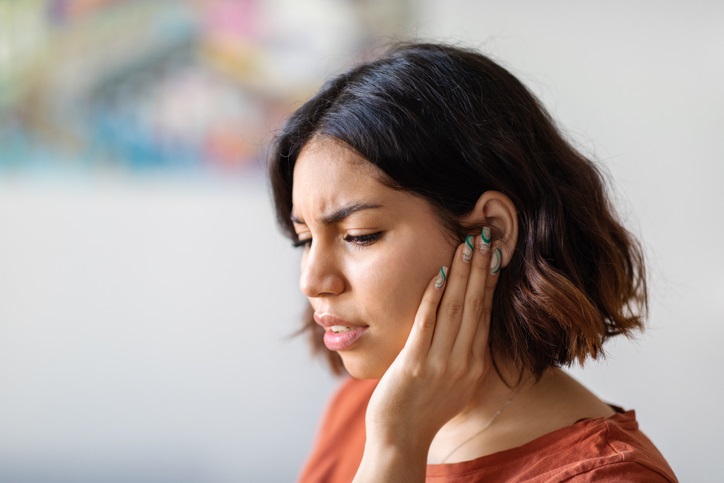Commitment + Clinical Leadership = Better Outcomes

Signs That You Might Have Hearing Loss
Have you felt like maybe you’ve had to turn the volume up on the TV more than usual? Or perhaps you don’t feel as though people speak loud enough when talking during a conversation. As a result, you might be worried that you could be experiencing hearing loss in one or both of your ears.
As people age, they are more likely to experience hearing loss. It is estimated that approximately 40 million people – or 15.5% of Americans over 18 – have experienced hearing loss in some way.1
Here are some signs of going deaf, as well as what steps you should take if you experience hearing loss.
Types of Hearing Loss
There are 3 main types of hearing loss: sensorineural hearing loss, conductive hearing loss, and mixed hearing loss.2
- Sensorineural hearing loss. The most common type of hearing loss. It occurs when there is damage to the inner ear or hearing nerve
- Conductive hearing loss. Hearing loss that occurs in the outer or middle ear
- Mixed hearing loss. A combination of sensorineural and conductive hearing loss
Signs You Might Be Going Deaf in One or Both Ears
Some signs that you might be going deaf in one or both ears3,4
- Difficulty understanding words, especially when there is a lot of background noise
- Muffled speech/sounds
- Inability to hear high-pitched sounds, such as birds or the alarm clock
- Asking people to speak slower and louder
- Trouble hearing words that aren’t vowels
- Staying away from background noise due to the fact it hurts the ears
- Turning up the volume on devices such as the phone or television
- Ringing in the ears
What about Sudden Hearing Loss?
If you experience sudden hearing loss, this is usually known as sudden sensorineural (“inner ear”) hearing loss (SSHL). Usually, this type of hearing loss occurs quickly, usually within a day or a week. Sudden hearing loss is caused by a problem with the sensory organs in the inner ear.5
Most people who experience SSHL will wake up the next day with hearing loss. You should treat this as a medical emergency and visit a doctor as soon as you can. It is possible to recover some of your hearing back if you have SSHL, but delaying a proper diagnosis could impact your ability to take the proper steps to protect your hearing.
Hearing Loss Prevention
There are steps that you can take to protect your hearing as you age. You should have regular check-ups with your doctor so they can look into your ear and examine the ear canal.
If your hearing changes or if you think that you might have hearing loss, your doctor will be able to help you identify the cause. They also may be able to refer you to a hearing specialist who will be better able to assist with the type of hearing loss you have.
It’s especially important to get a hearing checkup if:6
- You have a family history of deafness or hearing loss
- You work in a noisy environment
- You take medications that impact your hearing
- You often engage in activities that are loud or noisy
How Does Hearing Loss Affect Everyday Life?
Hearing loss can affect your everyday activities, including:
- Talking and understanding others
- Driving and hearing horns or sirens
- Enjoying music or movies at a reasonable volume
- Working, from taking phone calls to hearing people at meetings
What to Do if You Experience Hearing Loss
If you experience hearing loss, you should visit an audiologist. The audiologist will be able to conduct a test and tell you what type of hearing loss you have.
Additionally, an audiologist can give you tips or next steps to adjust living with your hearing loss. For example, you may be able to get a hearing aid to help you hear better.
Saber Healthcare
Saber Healthcare is an organization that provides services to more than 130 buildings across the states of Ohio, Pennsylvania, Virginia, North Carolina, Indiana, and Delaware. To learn more about our company and services, click here.
Saber Healthcare is an organization dedicated to providing consultant services to long-term care providers. This article is for informational purposes and is not meant to be seen as professional advice. Please consult with a medical expert before relying on the information provided.
Sources
- https://www.ncoa.org/adviser/hearing-aids/hearing-loss-america/#:~:text=The%20state%20of%20hearing%20loss,Control%20and%20Prevention%20(CDC).
- https://www.saberhealth.com/news/blog/how-our-hearing-works
- https://www.mayoclinic.org/diseases-conditions/hearing-loss/symptoms-causes/syc-20373072
- https://www.cdc.gov/nceh/hearing_loss/how_do_i_know_if_i_have_hearing_loss.html
- https://www.nidcd.nih.gov/health/sudden-deafness#:~:text=Sudden%20sensorineural%20(%E2%80%9Cinner%20ear%E2%80%9D,frequently%20affects%20only%20one%20ear.
- https://www.cdc.gov/nceh/hearing_loss/how_do_i_know_if_i_have_hearing_loss.html
